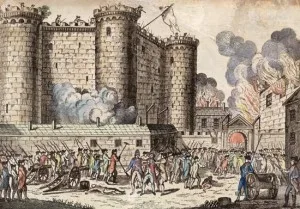
Ann Coulter is a dolt. But I repeat myself. (With apologies to Mark Twain).
Ann’s the most recent Right-Fringe Pundit to make the argument that, because the Nazis were, formally, named the National Socialist Party, they were, in fact, Socialists, and therefore all the folks on the Left (liberals, progressives, Democrats) are actually socialists and, thus, actually, Nazis.
No, really. I guess that means that FDR vs. Hitler was Left vs Left, with red-blooded American patriiots along for the socialist ride.
Let’s look at the latest iteration of this particular argument, with Coulter appearing on The 700 Club, talking with Gordon Robertson about her new book, a level-headed and well-balanced examination of the issues titled Demonic: How The Liberal Mob is Endangering America.
Robertson: Is it your book, you’re targeting liberal behavior but can’t you say that because the National Socialist Party used it too, that it’s a critique of all political movements, and particularly all political movements that are adept at manipulating media.
Coulter: Yes though I consider the National Socialist Party on the left. It comes from…you know, whether it is called communism, or socialism, or anarchy, what happened in the Russian Revolution was copied in Nazi Germany, in Russia, in Cuba, in China, in Vietnam.
Yes, Lenin was a Nazi. Castro is a Nazi. Mao was a Nazi. Ho Chi Minh was a Nazi.
They’re everywhere, you know.

Just for giggles, here’s the Wikipedia definition of National Socialism. Granted, Wikipedia isn’t the Encyclopedia Britannica, but it does seem a bit more in-depth and nuanced of a view than, say, Ann Coulter’s.
Nazism was founded out of the current of the far-right and racist German völkisch nationalist movement and the violent anti-communist Freikorps paramilitary culture that fought against the uprisings of communist revolutionaries in post-World War I Germany.[9] The ideology was created by Anton Drexler as a means to draw workers away from communism and into völkisch nationalism.[10] Nazism presented itself as politically syncretic, incorporating policies, tactics and philosophies from right- and left-wing ideologies, though a majority of scholars identify it as a far right form of politics.[11]
Nazism believed in the supremacy of an Aryan master race over all other races.[12] Nazis viewed the progress of humanity as depending on the Aryans and believed that it could maintain its dominance only if it retained its purity and instinct for self-preservation.[13] They claimed that Jews were the greatest threat to the Aryan race.[14] They considered Jews a parasitic race that attached itself to various ideologies and movements to secure its self-preservation, such as: capitalism, democracy, the Enlightenment, industrialisation, liberalism, Marxism, parliamentary politics, and trade unionism.[15] To maintain the purity and strength of the Aryan race, the Nazis sought to exterminate or impose exclusionary segregation upon “degenerate” and “asocial” groups that included: Jews, homosexuals, Romani, blacks, the physically and mentally handicapped, Jehovah’s Witnesses and political opponents.[16]
Nazism promoted an economic Third Position; a managed economy that was neither capitalist nor communist.[17][18] It officially promoted a form of right-wing socialism.[19][20][21][22] This economic system rejected egalitarianism and instead supported a stratified economy with classes based on merit and talent, retaining private property, and promoted the creation of national solidarity that would transcend class distinction.[23] The economy was to be subordinate to the goals of the political leadership of the state.[24] It was to provide to members of the Aryan race: economic security, social welfare programs for workers, a just wage, honour for workers’ importance, and protection from capitalist exploitation.
In short, it was an race-based nativist / protectionist-controlled economy, both promoting and exploiting capitalist and property-based economics (many of the major industrialists of Germany were Nazis) while striking up an us-vs-them jingoistic philosophy that painted it as the protector of the pure German race against all other ideologies and races. The Nazis made the interests of the state, the people, and the great industrial giants one — and socialists, communists, and trade unionists were all likely to end up in prison camps when arrested by the Nazi regime.
In other words, not quite your Campus Democrats. Coulter’s suggestion that the Nazis were a leftist organization is absurd.
Coulter: It is the revolt of a mob and it is a small group of elites basically running the populace’s lives.
Like, oh, say, the Tea Party and the Religious Right.
Coulter: Our revolution by contrast, the French Revolution with the American Revolution, which occurred at about the same time, …
Well, the French Revolution took place half a generation later (1789 vs 1776).
Coulter: … and the two revolutions are lied about fairly consistently in the media as if you know, ‘the French Bastille Day it’s much like July 4th.’

I don’t know that I’ve ever heard of the two called “much like,” except that they are both the celebrated “independence days” of the United States vs. France.
I don’t think any serious historian, regardless of his or her ideological bent, would call the two the same.
Coulter: No, Bastille Day would be if this country celebrated the Manson Family murders or the L.A. riots. The revolutions could not be more opposite.
Wow. I’d ask to try a bit of whatever Coulter’s high on here, except that it sounds like a bad trip. There is no easy analog between Bastille Day and the American revolution. Perhaps if we celebrated the Boston Massacre … or the Boston Tea Party.
But, then, the two revolutions were taking place in a very different atmosphere. The American revolution was fundamentally over disputes of governance and taxes, and fears that the English crown was taking away fundamental rights that the colonists felt they had for self-governance and representation. They feared they were being turned into a peasantry under the English Crown and Parliament.
The French Revolution, on the other hand, was a revolt against a very local and long-standing despotism. The peasants were, in fact, revolting, against an absolute monarchy of a style the English had done away with a century before, abetted by a Church that supported it.
John Kennedy said, “Those who make peaceful revolution impossible will make violent revolution inevitable.” The American Revolution was a relatively peaceful one — politician vs politician, army vs army. The French Revolution was, in fact, a true revolt, a violent upheaval against despotism that, in turn, unleashed a bloodbath of retribution.
Unlike Thomas Jefferson, I will by no means defend or make excuses for the brutality of the Terror that followed the French Revolution. But if the character of the two nations’ revolutions were different, it is certainly because the situation of the two nations pre-revolution was very different. For Coulter to act like they were the same (or that anyone treats them as the same) is ludicrous.
That having been said, “Bastille Day” was by no means a Manson Family Tate-LaBianca bloodbath.
In the wake of the 11 July dismissal of Jacques Necker, the people of Paris, fearful that they and their representatives would be attacked by the royal military, and seeking to gain ammunition and gunpowder for the general populace, stormed the Bastille, a fortress-prison in Paris which had often held people jailed on the basis of lettres de cachet, arbitrary royal indictments that could not be appealed. Besides holding a large cache of ammunition and gunpowder, the Bastille had been known for holding political prisoners whose writings had displeased the royal government, and was thus a symbol of the absolutism of the monarchy. As it happened, at the time of the siege in July 1789 there were only seven inmates, none of great political significance.
When the crowd—eventually reinforced by mutinous gardes françaises—proved a fair match for the fort’s defenders, Governor de Launay, the commander of the Bastille, capitulated and opened the gates to avoid a mutual massacre. However, possibly because of a misunderstanding, fighting resumed. Ninety-eight attackers and just one defender died in the actual fighting, but in the aftermath, de Launay and seven other defenders were killed, as was the ‘prévôt des marchands’ (roughly, mayor) Jacques de Flesselles.
The storming of the Bastille was more important as a rallying point and symbolic act of rebellion than a practical act of defiance.
But — probably because they’re French (and European to boot), Coulter can’t help but rebelling, rhetorically, against them, too.
Coulter: Our revolution was a revolution of Christians.

Um, I think you will find that France is generally considered (in the 18th century even more so) a Christian nation. It was a primarily Catholic country (does Coulter think that Catholics aren’t Christians?).
In many ways, the French Revolution was even more involved in religion than the American one. Though the Great Awakening earlier in the 18th Century had laid a certain groundwork for American Revolution, it was not significantly an religious revolution. On the other hand, the entanglement between the French Crown and the Catholic Church in France (and the Church’s role as feudal land owner) meant that as the former was rebelled against, it was difficult to not similarly rebel against the latter. In the course of the French Revolution, the vast estates that were owned by the Church were taken over by the State, and the clergy became licensed employees of the State itself.
A cautionary tale, one would think, for those who think entangling the Church in American with the State is a fine idea. These things never end well for either party.
So, let’s sum up:
- Coulter thinks the “National Socialists” in 1930s Germany were leftists because they had the word “socialists” in their name. She’s stunningly wrong, as demonstrated by that very party’s actions toward actual, y’know, socialists.
- Coulter thinks Bastille Day was like a Manson murder. Which might be true if Sharon Tate was a prison warden, the Manson family were folks off the street, and ten of the Manson gang were killed for each murder victim.
- Coulter thinks the American Revolution was populated by Christians, while the French Revolution was populated by folks who were definitely not Christians, but perhaps were Nazis.
Yeah. Dolt.









